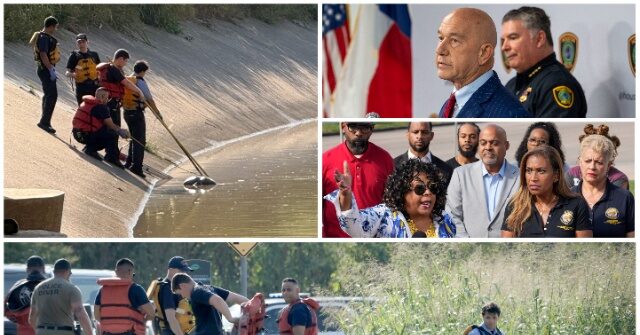The discovery of sixteen deceased people found in Houston area bayous since January has sparked concerns from area residents that the deaths may be the work of a serial killer. Houston’s Mayor John Whitmire and the city’s police chief counter the argument, saying there is no evidence the deaths are connected.
The total of deceased found this year in the bayous adds to 26 others discovered last year. Several press conferences have been held in recent weeks to address the concerns of community members that something evil is afoot in Texas’s largest city.
The latest discovery occurred on Wednesday when Houston police officers recovered the body of a man found in White Oak Bayou. Authorities say the discovery came after an earlier citizen report of a suspected drowning. According to a Houston Police Department press release, the discovery of the body was near the 100 block of Marie Street, and the remains showed no signs of foul play. A dive team pulled the remains from the bayou, and an autopsy will assist in determining the cause of death.
Seven similar recoveries from Houston area bayous have occurred since mid-September, according to authorities. The discoveries have led to a flurry of social media posts criticizing the information flow from Houston authorities regarding the evidence, or lack thereof, present during the recoveries.
One post on social media by CCFreedmen on X (formerly Twitter) captures the frustration felt by relatives of those discovered deceased in the bayous. The post reads, “If you have any information about who may have murdered my cousin Jade McKissic, please call the Houston Police Department. Jade sadly was the 12th victim found murdered & left in a bayou. Jade was a 3rd-year student at the University of Houston and loved by her community & family.”
Houston Mayor Whitmire has remained firm in his assertion that there is no serial killer on the loose when responding to community outcry and the wave of social media concern that continues to mount.
During the latest press conference on the matter, Whitmire doubled down on the lack of connection between the deaths, saying, “There is no evidence that there is a serial killer loose on the streets in Houston, Texas. If there was, you would hear it from me first.”
Whitmire’s confidence that a serial killer is not involved in the deaths is not convincing to some, who say the evasiveness by authorities to provide even basic information about the cases is proving stressful.
Breitbart Texas spoke to Tomaro Bell, a Houston community leader, about the discovery of the deceased and the concerns expressed by area residents. Bell is the Chairwoman of MacGregor Super-Neighborhood, a collection of neighborhoods on both sides of Brays Bayou east of the Texas Medical Center.
Bell has attended several press conferences on the deaths and has amplified the concerns of her community members, saying the evasiveness in providing even basic information after a discovery is a cause for great concern.
Bell told Breitbart Texas the number of deceased people pulled from the bayous may be higher than the total reported. “I’ve heard numbers as high as 23 since January when you count the person pulled from the Bayou on Wednesday,” Bell emphasized.
The bayous run through many neighborhoods in the Houston area. Bell says if you set foot in the city, “you’re near a bayou.”
Thus far, according to Bell, the lack of information continues. The latest information police and city officials put out only addressed six of the cases from this year, and details were minimal. Bell says, “That’s not enough to make me feel safe in our city, and people deserve that. Authorities have offered up no solutions, no increase in surveillance, and no increase in patrols, nothing.”
Randy Clark is a 32-year veteran of the United States Border Patrol. Before his retirement, he served as the Division Chief for Law Enforcement Operations, directing operations for nine Border Patrol Stations within the Del Rio, Texas, Sector. Follow him on X (formerly Twitter) @RandyClarkBBTX.



